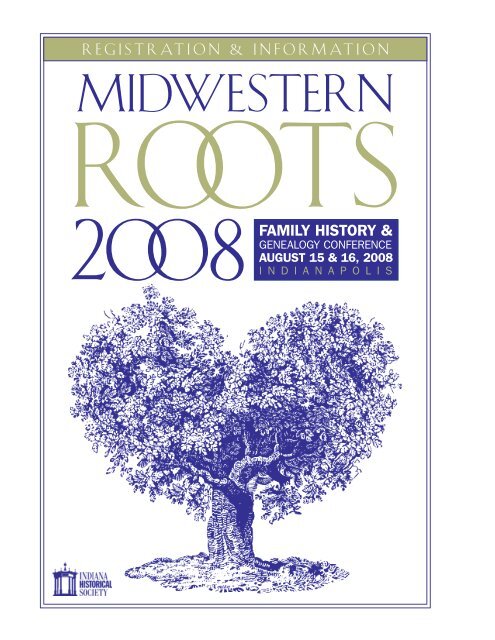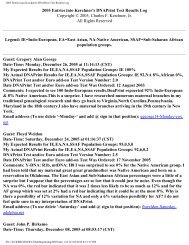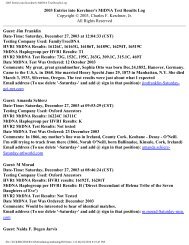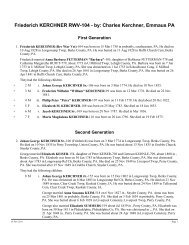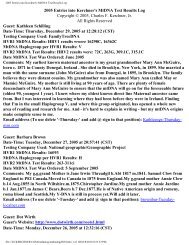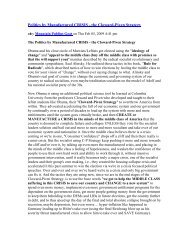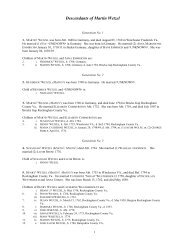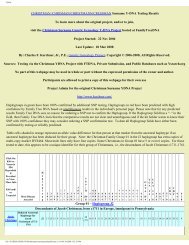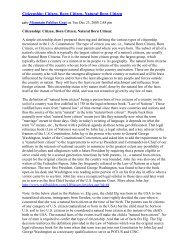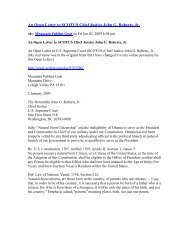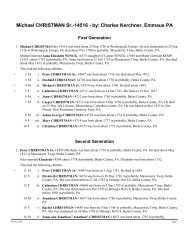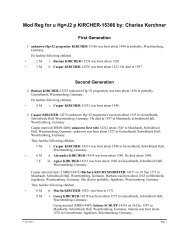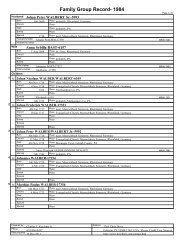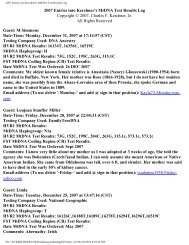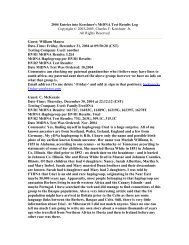MidWest Roots 2008 Genealogy Conference - Kerchner
MidWest Roots 2008 Genealogy Conference - Kerchner
MidWest Roots 2008 Genealogy Conference - Kerchner
Create successful ePaper yourself
Turn your PDF publications into a flip-book with our unique Google optimized e-Paper software.
REGISTRATION & INFORMATION<br />
MIDWESTERN<br />
ROOTS<br />
2OO8<br />
FAMILY<br />
HISTORY &<br />
GENEALOGY CONFERENCE<br />
AUGUST 15 & 16, <strong>2008</strong><br />
INDIANAPOLIS
Midwestern <strong>Roots</strong> <strong>2008</strong>: Family History and <strong>Genealogy</strong> <strong>Conference</strong><br />
at the Indianapolis Marriott East, 21st Street and Shadeland Avenue<br />
Your family is waiting for you. . . . Come find them deep in the heartland at the Midwestern <strong>Roots</strong> <strong>2008</strong>: Family History and<br />
<strong>Genealogy</strong> <strong>Conference</strong>! The Indiana Historical Society will host the conference at the Indianapolis Marriott East, Aug. 15 and 16,<br />
<strong>2008</strong>, with pre-conference activities on Aug. 14. Midwestern <strong>Roots</strong> <strong>2008</strong> features more than 30 presentations by national and<br />
regional experts and covers a range of topics, from sources, methodology and technology to DNA, storytelling, photo preservation,<br />
Internet linking and much more. Indianapolis is just a short trip from many midwestern metropolitan areas. The conference center<br />
is conveniently located off I-465 with free parking and two hotels in order to fit your budget. Multiple registration options are available<br />
so that you can plan on attending all three days or just the one day that fits your hectic schedule. Plan on joining us.<br />
A number of genealogical research facilities are located in the<br />
Indianapolis area. They range from county libraries and area<br />
museums to national organizations. The William Henry Smith<br />
Memorial Library at the Eugene and Marilyn Glick Indiana<br />
History Center, the Indiana State Archives, and the <strong>Genealogy</strong><br />
Division of the Indiana State Library will be open late Thursday,<br />
Aug. 14. The Smith Library, the Indiana State Archives and the<br />
William Henry Smith Memorial Library at the<br />
Eugene and Marilyn Glick Indiana History Center<br />
450 West Ohio Street, Indianapolis, IN<br />
Thursday, Aug. 14, Hours 10 A.M.–7 P.M.<br />
Friday, Aug. 15, Hours 10 A.M.–5 P.M.<br />
Saturday, Aug. 16, Hours 10 A.M.–5 P.M.<br />
The William Henry Smith Memorial<br />
Library at the Eugene and Marilyn Glick<br />
Indiana History Center contains a world<br />
famous collection of Indiana and Old<br />
Northwest material, including books,<br />
maps, photographs and manuscripts. Not<br />
only do the resources and collections help<br />
tell Indiana’s story, but they can help tell<br />
the story of your family as well. The<br />
Thursday pre-conference presentations<br />
will highlight the resources available to<br />
family history researchers in the William<br />
Henry Smith Memorial Library. The<br />
presentation will be followed by<br />
orientation to the library. To plan your visit<br />
go to the IHS Web site at<br />
www.indianahistory.org.<br />
Accessibility<br />
All conference facilities are accessible<br />
to those with physical disabilities. If you<br />
require special accommodations,<br />
please let us know in advance: phone<br />
(317) 232-1882 or (800) 447-1830;<br />
fax (317) 234-0427; or e-mail<br />
welcome@indianahist<br />
elcome@indianahistor<br />
ory.org<br />
.org.<br />
Come Early and Research<br />
Indiana State Archives<br />
6440 East 30 th Street, Indianapolis, IN<br />
Thursday, Aug. 14, Hours 8 A.M.–7 P.M.<br />
Friday, Aug. 15, Hours 8 A.M.–4:30 P.M.<br />
Saturday, Aug. 16, Closed<br />
The Indiana State Archives is the<br />
permanent repository for Indiana state<br />
and local government records of<br />
historical and legal significance,<br />
containing records of the executive,<br />
legislative and judicial branches dating<br />
back to the 1790s. Holdings include<br />
papers of every governor; acts and<br />
reports of the General Assembly;<br />
supreme and appellate court case files;<br />
records from over 500 past and present<br />
state agencies; military records for<br />
Hoosier veterans dating to 1811; Indiana<br />
public land records (state and federal);<br />
records from state-operated correctional,<br />
educational and hospital facilities;<br />
naturalization records from Indiana<br />
county courts; county poor farm reports;<br />
1820–80 federal censuses of agriculture<br />
and manufactures; Board of State<br />
Charities files for children in foster care<br />
1890–1920; and inheritance tax indexes<br />
from 1913–68. The Web site of the State<br />
Archives is www.in.gov/icpr/archives.<br />
Hotel Accommodations: Stay at a host hotel and get a complimentary<br />
ticket for the Thursday evening panel discussion<br />
By staying at a host hotels, the Indianapolis Marriott East or La Quinta Inn, you will be<br />
supporting the conference and be close to the action. As a guest of the Marriott East<br />
or La Quinta Inn you may also attend the Thursday evening panel discussion at no<br />
charge. To make a reservation at the Indianapolis Marriott East, 7202 East 21 st<br />
Street, call (317) 352-1231 or (800) 228-9290 to receive the special $99 room rate.<br />
For the La Quinta Inn, 7304 East 21 st Street, call (317) 359-1021 to receive the<br />
special $72 room rate. Please indicate your association with Midwestern <strong>Roots</strong> <strong>2008</strong>.<br />
Room reservations must be made by July 21, <strong>2008</strong>.<br />
Indiana State Library are offering resource orientation sessions<br />
on Thursday, Aug. 14 at 10 a.m. or 1 p.m. There is no cost for<br />
the resource orientation sessions, but you must have a<br />
reservation. To make a reservation for a session call (317)<br />
233-5659. A complete list of additional research facilities may<br />
be found on the conference Web site, or call (317) 233-5659<br />
to request a list of facilities and contact information.<br />
<strong>Genealogy</strong> Division of the Indiana State Library<br />
140 North Senate Avenue, Indianapolis, IN<br />
Thursday, Aug. 14, Hours 8 A.M.–7 P.M.<br />
Friday, Aug. 15, Hours 8 A.M.–4:30 P.M.<br />
Saturday, Aug. 16, Hours 8 A.M.–4 P.M.<br />
The <strong>Genealogy</strong> Division of the Indiana<br />
State Library houses one of the Midwest’s<br />
major collections of family and local<br />
history. Emphasis is on Indiana and the<br />
states from which Indiana was settled,<br />
particularly Virginia, North Carolina, Ohio,<br />
Kentucky, Tennessee and Pennsylvania,<br />
but there are also significant holdings on<br />
other Mid-Atlantic states, New England,<br />
Germany and Great Britain. Discover<br />
more about the state library at<br />
www.in.gov/library.<br />
Indiana Historical Society<br />
Indiana’s Storyteller TM :<br />
Connecting People to the Past.<br />
Become a member of the Indiana<br />
Historical Society and receive the member<br />
registration discount. The best way to<br />
experience all that the Indiana Historical<br />
Society has to offer is as a member.<br />
Enjoy members’ exhibition openings,<br />
member tours and more. Additional<br />
member benefits include discounted or<br />
free admission to IHS programs and<br />
events; discounts in the Basile History<br />
Market; reciprocal benefits at other<br />
historical and cultural organizations<br />
nationwide; a bimonthly newsletter,<br />
INPerspective; complimentary subscriptions<br />
to quarterly periodicals Traces of Indiana<br />
and Midwestern History and THG:<br />
Connections and more. For more information<br />
visit www.indianahistory.org.
Pre-<strong>Conference</strong> Activities—Thursday, Aug. 14, <strong>2008</strong><br />
Comput<br />
puter Labs - Eugene and Marilyn Glick Indiana History Center,<br />
450 West Ohio Street<br />
The number of genealogical resources available on the Internet<br />
increases daily. The two-hour morning lab will focus on Indiana online<br />
resources presented by Suzanne Hahn from the Indiana Historical<br />
Society. The three-hour afternoon lab will be presented by Beau<br />
Sharbrough from Footnote.com. This advanced computer lab will<br />
provide a hands-on opportunity to explore a number of research sites.<br />
Participants will have a live connection to the Internet and<br />
should have a basic knowledge of Microsoft Internet Explorer.<br />
Seating is limited to 20 participants per workshop.<br />
Navigating the Maze: Finding Indiana Records Online,<br />
10 A.M.–<br />
.–NOON<br />
This session will explore the many Indiana online resources<br />
available to family history researchers. Discover the wealth of<br />
free information available from libraries, state agencies and<br />
historical societies from across the state. Participants will learn<br />
where to find these online gems and tips for searching them.<br />
Genealogical Resear<br />
esearch ch on the Interne<br />
ernet,<br />
t, 1–4 P.M.<br />
This advanced computer lab will provide a hands-on opportunity to<br />
explore a number of research tools available on the Internet. Learn<br />
what can be found and how to make the best use of sites such as<br />
Footnote.com, WorldVitalRecords.com, Ancestry.com and Google.<br />
Histor<br />
ory y Lab–Eugene and Marilyn Glick Indiana History Center,<br />
450 West Ohio Street<br />
10 A.M., , 11 A.M. and NOON. Program is free and limited to 12<br />
people per session. Call (317) 233-5659 to make a reservation.<br />
Historical documents such as diaries and letters provide the<br />
evidence family historians use to solve the mysteries of the<br />
past. Preserving these documents for the future is the job of<br />
the Indiana Historical Society Conservation Lab. And now you<br />
too can learn this science in the History Lab–a new visitor<br />
experience offered by the IHS.<br />
Donning lab coats and handling conservation tools and<br />
materials, History Lab guests will become acquainted with<br />
conservation concepts as they develop skills they can apply to<br />
their own family treasures. Guests will learn about conservation<br />
related concepts and “tools of the trade,” view before-andafter<br />
treatment displays and learn about conservation storage<br />
materials. Newsprint will be used to learn the basic skills<br />
involved in assessing and repairing tears in damaged papers.<br />
The session will conclude with a tour of the IHS Conservation Lab.<br />
Evening Panel Discussion at the Eugene and Marilyn Glick Indiana History Center, 6–9 P . M.<br />
The evening will begin with an Indiana summer picnic dinner in<br />
the Lilly Hall at the History Center on Thursday evening. The<br />
dinner will include pulled pork sandwiches, baked beans, corn<br />
on the cob, cole slaw and ice cream. Following the dinner, three<br />
pioneers in genetic genealogy will explore the evolution of DNA<br />
testing for genealogy research and DNA’s potential and presentday<br />
uses for genealogists in the panel discussion The Evolution<br />
of Genetic <strong>Genealogy</strong>. Panelists include Megan Smolenyak<br />
Smolenyak, chief family historian and North American<br />
spokesperson for Ancestry.com; Roberta J. Estes, founder of<br />
DNAeXplain; Charles F. <strong>Kerchner</strong>, founder of one of the first Y-<br />
The Evolution of Genetic <strong>Genealogy</strong><br />
Library y Wor<br />
orkshop<br />
- Indiana State Library, 140 North Senate Avenue<br />
<strong>Genealogy</strong> Resour<br />
esources Library y Wor<br />
orkshop,<br />
9 A.M.–4:1<br />
.–4:15 P.M.<br />
This workshop was designed especially for frontline library<br />
workers and volunteers who answer questions from genealogy<br />
patrons. Seating is limited.<br />
8:15-9 A.M. Registration and refreshments<br />
9-9:15 A.M. Welcome and opening remarks<br />
9:15-10:15 A.M.Serving the 21 st Century <strong>Genealogy</strong> Customer<br />
Susan Kaufman<br />
10:30-11:30 A.M.Federal Documents of Interest to Genealogists<br />
Autumn Gonzalez<br />
11:30 A.M.-1 P.M. Lunch on your own<br />
1-2 P.M. Solving the Problem in 25 Hours or Less<br />
Christine Rose<br />
Successful strategies are presented to maximize<br />
research on or offsite using a case study.<br />
2:15-3:15 P.M.Where Can I Find…?<br />
Susan Kaufman, Autumn Gonzalez, Suzanne Hahn<br />
and Vicki Casteel<br />
Q&A<br />
3:15-4:15 P.M.Tour of the Indiana State Library<br />
Writing Wor<br />
orkshop<br />
kshop–Eugene and Marilyn Glick Indiana History Center,<br />
450 West Ohio Street<br />
Preparing Your our Family Histor<br />
ory y for Publication: A Writing<br />
Wor<br />
orkshop,<br />
10–1<br />
0–11:30<br />
1:30 A.M. OR 1–2:30 P.M.<br />
This workshop will focus on communicating effectively. It will include<br />
a discussion of essential writing skills, such as organization,<br />
documentation, effective word choice and clarity. M. Teresa Baer<br />
and Rachel M. Popma, editors at the Indiana Historical Society<br />
Press, will also use samples of writing on genealogical topics to<br />
illustrate common grammatical and stylistic problems.<br />
After the discussion the participants will put their writing skills<br />
to practical use by editing writing samples together. The<br />
presenters will then meet one-on-one with the participants to<br />
critique their individual writing samples.<br />
Along with the registration form and fees, each participant<br />
should submit a brief writing sample, including a short outline<br />
of his or her project along with a one-page writing sample. These<br />
projects may be for self publication of family history or<br />
submissions for professional publications. Seating is limited to<br />
10 participants per session.<br />
DNA surname projects; and moderator Curt Witcher. Receive a<br />
complimentary ticket to the panel discussion if you stay at the<br />
Indianapolis Marriott East.<br />
Bus transportation will be available from the Indianapolis<br />
Marriott East to the History Center for the evening presentation.<br />
The bus will leave from the host hotel at 5:15 P.M. and return to<br />
the hotel at the conclusion of the program, approximately 9 P.M.<br />
A nominal fee will be charged for this service. There is also<br />
parking available at the History Center.
Thursda<br />
sday, , Aug.<br />
g. 14,<br />
4, <strong>2008</strong><br />
3–8 P.M. Registration and packet pick-up at the Indianapolis Marriott East<br />
Frida<br />
riday, , Aug<br />
ug. 15, , <strong>2008</strong><br />
10:30–1<br />
0:30–11:30<br />
1:30 A.M. LUNCH<br />
Leaping to Erroneous Conclusions<br />
7:30 A.M.–7 P.M. Registration Christine Rose F-2<br />
Lunches will<br />
8 A.M.–6 P.M. Exhibit Hall What did the record REALLY say? We often look<br />
be available<br />
8:45 A.M. Welcome at a document and quickly come to a conclusion 11:30<br />
1:30 A.M.–1:30<br />
P.M.<br />
as to what it means. But...does it really tell us Tak<br />
ake a break from<br />
9–10 A.M.<br />
that? We will look at numerous instances where<br />
the sessions, visit with<br />
we can misinterpret the evidence.<br />
your friends<br />
OPENING SESSION<br />
and experience the<br />
Genetic <strong>Genealogy</strong>: An Introduction<br />
exhibit hall.<br />
Charles F. <strong>Kerchner</strong> Jr. F-3<br />
Presentation of the basics about genetic genealogy<br />
Menu<br />
and DNA testing. What is DNA? What are the<br />
Summer Salad Buffet<br />
different types of DNA, where are they are located,<br />
how are they inherited, and what are DNA markers<br />
Cookie or Brownie<br />
and types of DNA tests used in genetic genealogy?<br />
Coffee, Iced Tea<br />
Family Letters and the Story of an<br />
American Woman in World War II<br />
James H. Madison F-1<br />
People far away in war almost<br />
always write home. Their wartime<br />
letters offer superb insights into<br />
other times and places and also into<br />
the meaning and importance of<br />
family and hometown connections.<br />
This session will focus on one<br />
woman who left her midwestern<br />
home for service in England and<br />
France during World War II. Using<br />
her letters to family and friends,<br />
Professor Madison will tell her story<br />
and illuminate the importance and<br />
use of wartime letters for family<br />
history.<br />
Using Government Documents for Genealogical<br />
Research<br />
Curt B. Witcher F-4<br />
The U.S. government is among the largest<br />
publisher in the world, yet many genealogists<br />
do not think of using federal, state and local<br />
government documents in their research.<br />
Pass It On—Part One<br />
Bob Sander F-5 (F-9 Pass It On—Part Two)<br />
Shared stories are the soil in which one’s family<br />
tree finds nourishment and brings them to life.<br />
In Part One learn from a professional storyteller<br />
how to understand that process using lecture,<br />
performance and co-creative interaction.<br />
Limited to 20 people per session.
Frida<br />
riday, , Aug<br />
ug. 15, , <strong>2008</strong><br />
1–2 P.M. 2:30–3:30 P.M. 4–5 P.M.<br />
One-Step Web Pages: A Potpourri of Genealogical<br />
Search Tools<br />
Stephen Morse F-6<br />
The One-Step Web site includes over 100 Webbased<br />
tools divided into 13 categories ranging<br />
from genealogical searches to astronomical<br />
calculations to last-minute bidding on eBay.<br />
Beyond Y-DNA<br />
Megan Smolenyak Smolenyak F-7<br />
Learn about surname studies using Y-DNA,<br />
mtDNA, SNP, BioGeographical and ethnic tests, as<br />
well as the Sorenson Molecular <strong>Genealogy</strong><br />
Foundation and the Genographic Project.<br />
Determine if one or more of them is right for you.<br />
Sponsored by the Indiana African American <strong>Genealogy</strong> Group<br />
WorldVitalRecords.com<br />
David Lifferth F-8<br />
Learn about WorldVitalRecords.com which<br />
includes thousands of genealogy databases<br />
and family history tools used by more than<br />
600,000 monthly visitors.<br />
Using Federal Land Records to Locate Ancestors<br />
Christine Rose F-10<br />
The case files of federal land records contain<br />
valuable genealogical data. This session will<br />
discuss homesteads, bounty land, cash files<br />
and other data available in these records.<br />
Finding Your Feminine Side: Mitochondrial DNA<br />
Roberta Estes F-11<br />
The footprints of your ancestors are sprinkled<br />
throughout you in your DNA, waiting for you to<br />
unravel the key to the mystery. Come and learn what<br />
mitochondrial DNA testing can do for you and your<br />
maternal line genealogy. Heartwarming case studies<br />
provide wonderful working examples.<br />
Title TBA<br />
Dick Eastman F-12<br />
A Century of Wedded Bliss: Indiana Marriage Laws<br />
1791–1891<br />
Betty L. Warren F-14<br />
A close look at the changes in the age of consent<br />
restrictions, residency requirements, and other<br />
factors of the legislative rules and regulations<br />
governing marriage in the state of Indiana.<br />
<strong>Kerchner</strong> Surname Y-DNA Project<br />
Charles F. <strong>Kerchner</strong> Jr. F-15<br />
The <strong>Kerchner</strong> Surname Y-DNA Genetic <strong>Genealogy</strong><br />
Project was launched in February 2001, one of the<br />
first such projects in the world. This session will<br />
discuss the goals, process, and results of starting<br />
and conducting a Y-DNA surname project to use Y-<br />
DNA testing to aid traditional genealogical research.<br />
Footnote.com<br />
Beau Sharbough F-16<br />
Learn what can be found at Footnote.com,<br />
search tips and user-contributed content. The<br />
site has content agreements with the NARA,<br />
FamilySearch.org, the Allen County Public<br />
Library, among others.<br />
Pass It On—Part Two<br />
Bob Sander F-9 (F-5 Pass It On—Part One)<br />
In Part Two learn to use the skills presented in<br />
Part One to discover, develop and present your<br />
own stories. Limited to 20 people per session.<br />
Convicts to the Colonies: Criminal Transportation<br />
Prior to the Revolution<br />
Susan D. Kaufman F-13<br />
Prior to 1776 the colonies accepted transported<br />
criminals. Documents rich in the names of ordinary<br />
people offer a glimpse into the conditions in which<br />
two countries dealt with population growth.<br />
What Color Ellis Island Search Form Should I Use?<br />
Stephen Morse F-17<br />
In April 2001 the Ellis Island ship records went<br />
online. A few weeks later the One-Step Ellis<br />
Island Web site was created and over time<br />
greatly expanded with an array of color-coded<br />
search forms.<br />
EVENING PROGRAM<br />
6–7 P.M.<br />
Reception, Cash Bar<br />
7 P.M. . BANQUET<br />
Megan’s Mini-Film Festival<br />
Megan Smolenyak Smolenyak F-18<br />
The mini-film festival will focus on DNA testing<br />
as seen through the lens of individual<br />
experiences. Three episodes of DNA Stories, a<br />
<strong>Roots</strong>Television.com series, will be featured:<br />
“A Tale of Two Fathers,” “Were They Sisters?,”<br />
and “Did She Marry Her Cousin?”<br />
Menu<br />
Garden Fresh Green Salad<br />
Petite Prime Rib of Beef<br />
Chef’s choice of<br />
starch and vegetables<br />
Roll<br />
Black Forest Cake<br />
Coffee, Iced Tea<br />
Expanded session descriptions<br />
and speaker information<br />
can be found on the<br />
conference Web site.<br />
Check out the conference blog<br />
and read more about the<br />
conference:<br />
midwesternroots<strong>2008</strong>.<br />
blogspot.com<br />
Early Registration Deadline<br />
July 25, <strong>2008</strong><br />
www.indianahistory.org/midwesternroots
Saturda<br />
day, , Aug<br />
ug. 16, , <strong>2008</strong><br />
8 A.M.–4 P.M. Registration<br />
8 A.M.–4 P.M. Exhibit Hall<br />
8:45 A.M. Welcome<br />
9–10 A.M.<br />
OPENING SESSION<br />
Cases That Make My Brain Hurt<br />
Megan Smolenyak Smolenyak S-19<br />
How could brothers also be uncle<br />
and nephew? How could a soldier<br />
killed in Korea be alive 55 years<br />
later? How could the 1853 death of a<br />
toddler in Scotland help solve a Civil<br />
War history-mystery? Come and<br />
hear!<br />
10:30–1<br />
0:30–11:30<br />
1:30 A.M. LUNCH<br />
Doing Effective Genealogical Research in Libraries<br />
Curt B. Witcher S-20<br />
Lunches will<br />
This talk focuses on understanding the four major<br />
be available<br />
types of libraries—academic, private, public and<br />
11:30<br />
1:30 A.M.–1:30<br />
P.M.<br />
special—as well as techniques to prepare data in<br />
a manner in which it can be effectively presented<br />
Tak<br />
ake a break from<br />
to a librarian or archivist for review and“scouting”<br />
the sessions, visit with<br />
a facility before your visit.<br />
your friends<br />
Using Little-Known and Neglected Sources<br />
and experience the<br />
Christine Rose S-21<br />
exhibit hall.<br />
In this lecture a variety of records will be<br />
discussed, from land to federal to court and<br />
military. The examples presented will open<br />
many doors to the researchers who think<br />
they’ve examined everything.<br />
Automated Search Tools<br />
Beau Sharbough S-22<br />
Using GenSmarts, Google and site features at<br />
places like Ancestry.com and Footnote.com,<br />
you can find the needles in that huge<br />
haystack.<br />
Menu<br />
Sandwich Buffet<br />
Fruit Salad<br />
Chips<br />
Cookie or Brownie<br />
Coffee, Iced Tea<br />
1–2 P.M. 2:30–3:30 P. M. 4–5 P.M.<br />
Driving You Bonkers: Accessing State Hospital<br />
Records for Family Research<br />
Alan January S-24<br />
State hospital records are a gold mine of<br />
information. Learn how Indiana is managing access<br />
to state hospital records and how HIPAA impacts<br />
confidentiality statutes in Indiana and other states.<br />
Sponsored by the Friends of the Indiana State Archives<br />
Playing Hide and Seek in the U.S. Census<br />
Stephen Morse S-25<br />
The One-Step Census Web site presents a<br />
street aid for finding records (and has since<br />
been expanded to include 1910, 1920 and<br />
1940). The NARA and some commercial Web<br />
sites also have developed indexes. Learn<br />
various solutions to search using these tools.<br />
Preserving Family Photos<br />
Beau Sharbough S-26<br />
A demonstration of how to scan and restore<br />
photos using your scanner and some<br />
inexpensive software. We’ll also discuss how<br />
to take care of the originals and ways to share<br />
the photos with others.<br />
The Lost Colony DNA Project<br />
Roberta J. Estes S-23<br />
How did 115 Englishmen and women come to<br />
be lost in the Virginia wilderness in 1587?<br />
Mystery, murder, and intrigue...come and find<br />
out for yourself. Will we find them using DNA<br />
technology?<br />
Turning Your Research Into a Family History<br />
Nancy A. Massey S-28<br />
This presentation introduces the basics of<br />
turning your family history research into a book<br />
to be shared with others. Get help deciding the<br />
focus of your book, the organization of the book<br />
and how to create a publication that will be<br />
cherished by generations to come.<br />
Avoid the Crooked Path! Genealogical Problem Solving<br />
Christine Rose S-29<br />
Demonstrates with overheads and case<br />
studies how to zero in on the goal, reduce the<br />
problem and stay on the path to solve it. A<br />
great motivational talk.<br />
Innovative Tools to Connect Families<br />
David Lifferth S-30<br />
Discover FamilyLink.com, Inc. products and<br />
services including WorldVitalRecords.com and<br />
FamilyLink.com, as well as social networking<br />
Facebook applications such as We’re Related,<br />
Family Groups and My Will.<br />
Remembering Our Ancestors<br />
Megan Smolenyak Smolenyak S-32<br />
Let yourself be amused, amazed and touched<br />
by stories of the many creative ways people<br />
have developed to pay tribute to those who<br />
came before us, as well as tales of how some<br />
stubborn brick walls have come tumbling<br />
down in the most unexpected ways.<br />
Deep Linking and Deeper Linking: How to Get the<br />
Most Out of Existing Search Applications<br />
Stephen Morse S-33<br />
Deep linking provides a means of optimizing<br />
the information extracted from existing thirdparty<br />
Web sites in general, and from search<br />
applications in particular. These tools are<br />
used on the One-Step Web site.<br />
Title TBA<br />
Dick Eastman S-34<br />
Where DID I Find That Document?<br />
Betty L. Warren S-27<br />
This session will examine suggested techniques for<br />
acceptable source citation with examples of<br />
sources specific to genealogical research, such as<br />
census records, oral interviews, land records, tax<br />
lists and the Internet.<br />
Sponsored by the Indiana Chapter of Palatines to America<br />
Newspaper Research: A Mirror of History<br />
Susan D. Kaufman S-31<br />
Newspapers are reflective of the thoughts,<br />
morals, events and times of the communities<br />
and society they represent. Although content<br />
can vary, newspapers offer a greater insight<br />
into and a picture of your ancestors’ lives.<br />
Who Went Where…& Did What?!<br />
Curt B. Witcher S-35<br />
Directories can provide consequential data in<br />
attempting to develop a context in which to<br />
conduct meaningful family history research.<br />
This lecture identifies different types of<br />
directories, discusses the type of information<br />
one can hope to find, and provides the<br />
researcher with ideas for locating directories.
M. Teresa Baer, native Hoosier and managing editor of family history<br />
publications at the IHS Press, has written numerous genealogical articles for<br />
The Hoosier Genealogist (now THG: Connections) and has spoken on family<br />
history topics throughout the state. Baer holds an M.A. in comparative history,<br />
a B.A. in history, and an international studies certificate from Indiana<br />
University.<br />
Vicki Casteel, visual collections archivist at the Indiana State Archives,<br />
has worked primarily with the photograph collections; the Board of<br />
State Charities records, including those on the eugenics movement;<br />
and the Camp Morton records.<br />
Dick Eastman, author of Eastman’s Online <strong>Genealogy</strong> Newsletter, a<br />
weekly electronic publication, is a frequent international lecturer, editor<br />
and consultant.<br />
Roberta J. Estes, a professional scientist and business owner in the<br />
information technology arena (B.S. Computer Science; M.B.A.; graduate<br />
work in geographic information systems), has been an obsessed genealogist<br />
since 1978 and was one of the early DNA surname administrators and<br />
pioneer adopters of DNA analysis for genealogy. In 2005 she established<br />
DNAeXplain to provide personal DNA results analysis and genealogical<br />
services to surname project administrators and individuals seeking<br />
assistance with their results. She currently manages more than 20 surname<br />
projects, including the large regional Cumberland Gap Y-line and mtDNA<br />
projects with several hundred participants; co-administers the American<br />
Indian project; serves as an advisor to the Melungeon project and other<br />
groups; and has appeared in national publications and on television. Her<br />
genealogy specialty is Southern colonial records, focused primarily in<br />
Virginia, Tennessee and North Carolina.<br />
Autumn C. Gonzalez is a reference librarian with the <strong>Genealogy</strong><br />
Division of the Indiana State Library. She holds an M.L.S. from Indiana<br />
University in Indianapolis and B.A. in liberal studies from California<br />
Baptist University. Prior to coming to the Indiana State Library, she held<br />
positions at the Lawrence campus of Ivy Tech Community College in<br />
Indianapolis and Carmel Clay Public Library.<br />
Suzanne Hahn is director of reference services at the William Henry<br />
Smith Memorial Library at the Indiana Historical Society. Before joining<br />
the IHS staff in 2000, she worked at the Library of Congress and Center<br />
for Naval Analyses in Washington, D.C.<br />
Alan January is Director of Patron Services for the Indiana State<br />
Archives. He has worked since 1993 on managing records from seven<br />
closed state hospitals and developmental centers.<br />
Susan D. Kaufman is currently manager of the Clayton Library Center<br />
for Genealogical Research, Houston Public Library. She has been a<br />
genealogy librarian for more than 20 years, including six years at the<br />
Allen County Public Library in Fort Wayne, Ind., and has worked with<br />
local, state and national genealogical societies both as a board member<br />
and as a conference presenter. She is a director for the FGS board and<br />
a district representative for the Texas State Genealogical Society.<br />
Charles F. . Ker<br />
erchner Jr. is a retired professional engineer and has<br />
been a genealogist for more than 33 years, authoring several tutorial and<br />
help papers on Pennsylvania German research and the field of genetic<br />
genealogy (www.kerchner.com). He was a pioneer in genetic genealogy,<br />
launching in February 2001 the <strong>Kerchner</strong> Surname Project, one of the<br />
first dozen surname projects by a genealogist. The author of Genetic<br />
<strong>Genealogy</strong> DNA Testing Dictionary (www.ggdictionary.com), he currently<br />
manages more than 30 genetic genealogy projects, including a study to<br />
document the DNA markers found in the Pennsylvania German ethnic<br />
group. In 2005 he helped launch the International Society of Genetic<br />
<strong>Genealogy</strong> (www.isogg.org) and now serves as coordinator of the Mid-<br />
Atlantic section.<br />
David Lifferth has been the president of World Vital Records, Inc.<br />
since October 2006. Formerly a content engineer for MyFamily.com/<br />
Ancestry.com, he has been involved in releasing over 1 billion individual<br />
records online, including UK census, military records and birth, marriage<br />
and death indexes. Other database projects include the Executive<br />
Excellence Instant Consultant CD; the Littler Mendelson National<br />
Employer 1998, 1999 and 2000; the LDS Church Magazine CD, containing<br />
30 years of Ensign and other magazines; and the award-winning<br />
California State Bar CEB Practice Libraries 1996, 1997 and 1998. Lifferth<br />
holds a business degree in information management from Brigham<br />
Young University.<br />
James H. Madison is the Thomas and Kathryn Miller Professor of<br />
History and former chair of the department of history at Indiana University,<br />
Bloomington. His books include The Indiana Way: A State History; Eli<br />
Lilly: A Life; A Lynching in the Heartland: Race and Memory in America;<br />
and Slinging Doughnuts for the Boys: An American Woman in World War<br />
II. Madison is the recipient of IU’s Sylvia E. Bowmen Distinguished Teaching<br />
Award, the Organization of American Historians’ Distinguished Lecturer<br />
Speakers’ Biographical Information<br />
honor and the Indiana Historical Society’s Hoosier Historian Award. He<br />
serves as a member of the IHS Board of Trustees.<br />
Nancy A. Massey is currently the Indiana Room Assistant at the Hamilton<br />
East Public Library, where she assists patrons with their genealogical research.<br />
Recently appointed Hamilton County Genealogist by the Indiana Genealogical<br />
Society, she is also a teacher and presenter on genealogical topics. Massey<br />
has self-published family histories on her husband’s family and currently is<br />
working on a family history on her own maternal line. She earned a B.A. in<br />
history from the University of North Carolina at Charlotte.<br />
Stephen Morse is the creator of the One-Step Web site, for which he<br />
has received both the Outstanding Contribution Award and the Lifetime<br />
Achievement Award from the International Association of Jewish<br />
Genealogical Societies and the Award of Merit from the NGS. He was the<br />
recipient of the first-ever Excellence Award from the Association of<br />
Professional Genealogists. Morse also is a computer professional with<br />
a doctorate in electrical engineering. He has held various research,<br />
development and teaching positions; authored numerous technical<br />
papers; written four textbooks; and holds four patents. He is best known<br />
as the architect of the Intel 8086 (the granddaddy of today’s Pentium<br />
processor), which sparked the PC revolution 25 years ago.<br />
Rachel M. Popma is the assistant editor for family history publications<br />
at the Indiana Historical Society Press and an adjunct faculty member<br />
at Ivy Tech Community College in Indianapolis. She holds a B.A. from<br />
Ball State University and an M.A. from the University of Illinois at Urbana-<br />
Champaign.<br />
Bob Sander, a fourth-generation Hoosier and Indianapolis resident,<br />
is a co-founder of Storytelling Arts of Indiana, which brings the best<br />
storytellers locally, regionally and nationally to Indianapolis for an<br />
annual festival, a six-month storytelling series and special events that<br />
promote the art and use of storytelling. He is a recipient of Frank Basile<br />
Emerging Stories and Telling History Through Stories grants and in 2001<br />
was awarded a Creative Renewal Fellowship from the Arts Council of<br />
Indianapolis. His work draws on history, family stories and folktales<br />
and has been commissioned by such diverse organizations as the<br />
Indiana Department of Natural Resources, General Electric, RCI, the<br />
Indiana Humanities Council, the IHS and public radio and television.<br />
Beau Sharbrough, Houston native, received a B.A. in philosophy<br />
from Texas A&M University in 1977. His programming career began in<br />
1980, and he is presently a product manager for MyFamily.com. He is<br />
the founder of the FGS Web site, the GENTECH Web site, the Lexicon<br />
Working Group and a former president of GENTECH. He writes regularly<br />
on technical topics in family history, with an occasional overdose of<br />
humor, and maintains the <strong>Roots</strong>Works.com Web site.<br />
Megan Smolenyak Smolenyak is Chief Family Historian and North<br />
American spokesperson for Ancestry.com and a co-founder of the<br />
pioneering online television channel <strong>Roots</strong> Television. She is an<br />
internationally known speaker, researcher and consultant, and her work<br />
has been featured in such television series as Ancestors, They Came to<br />
America and African American Lives. Her Honoring Our Ancestors Grants<br />
Program has provided support for more than 75 genealogical initiatives,<br />
including the U.S. Army’s repatriation project, designed to trace the<br />
families of soldiers killed or missing in action in World War II, the<br />
Korean War and the Vietnam War and establish a DNA database to<br />
assist in identification of repatriated remains. An award-winning author,<br />
her latest book is Trace Your <strong>Roots</strong> with DNA: Using Genetic Tests to<br />
Explore Your Family Tree (with Ann Turner, M.D.).<br />
Christine Rose<br />
ose, CG, CGL, FASG, has lectured extensively at national<br />
conferences (including the NGS, FGS and GenTech) and many regional<br />
and local seminars. She has served on the faculty of the National<br />
Institute on Genealogical Research in Washington, D.C., and as an<br />
instructor and coordinator of Samford University’s Institute of <strong>Genealogy</strong><br />
and Historical Research since 1992. In 1987 she was awarded the<br />
American Society of Genealogists’ prestigious Donald Lines Jacobus<br />
Award for two Rose genealogies. Rose is a co-author of The Complete<br />
Idiot’s Guide to <strong>Genealogy</strong>.<br />
Betty L. Warren, secretary in the <strong>Genealogy</strong> Division at the Indiana<br />
State Library, has presented genealogy programs since 1989 and is a<br />
volunteer at the Johnson County Museum of History’s genealogy<br />
department. She is the immediate past-president of the IGS and has<br />
earned professional certification as a genealogist from Brigham Young<br />
University. Warren owns a family history research business, Be It<br />
Remembered, and sits on the IHS <strong>Genealogy</strong> Program Advisory Board.<br />
Curt t B. Witcher, MLS, FUGA, is manager of the Historical <strong>Genealogy</strong><br />
Department of the Allen County Public Library and curator of its Rare and Fine<br />
Book Collection. He is former president of NGS and FGS and founding president<br />
of the IGS. Witcher is also a member of the editorial board for THG: Connections.
Midwestern <strong>Roots</strong> <strong>2008</strong>: Registration Form and <strong>Conference</strong> Fees<br />
Preregistration for the conference is encouraged<br />
as seating is limited. Cancellations received after<br />
the early registration deadline of July 25, <strong>2008</strong>,<br />
cannot be refunded. Please call (800) 447-1830<br />
or return the registration form to reserve your<br />
space. After the early registration deadline, please<br />
call to confirm available space before sending<br />
your registration. A confirmation and directions<br />
will be sent.<br />
To help us assign sessions to rooms of appropriate<br />
size, please circle the sessions you expect to<br />
attend. You are not obligated to attend the<br />
sessions you mark, and a mark does not<br />
constitute a lecture reservation. Lectures are<br />
coded with the numbers given below. Use a<br />
separate registration form for each registrant.<br />
Friday<br />
9 A.M. 10:30 A.M. 1 P.M.<br />
F-1 F-2 F-6<br />
F-3 F-7<br />
F-4 F-8<br />
* F-5 * F-9<br />
* These sessions will be limited to 20 people.<br />
Acknowledgment of your participation in these<br />
two sessions will be sent with your conference<br />
confirmation letter.<br />
Saturday<br />
9 A.M. 10:30 A.M.<br />
S-19 S-20<br />
S-21<br />
S-22<br />
S-23<br />
Payment method:<br />
Check (payable to the Indiana Historical Society)<br />
Visa<br />
Discover<br />
Credit card number<br />
Signature<br />
1 P.M.<br />
S-24<br />
S-25<br />
S-26<br />
S-27<br />
2:30 P.M.<br />
F-10<br />
F-11<br />
F-12<br />
F-13<br />
2:30 P.M.<br />
S-28<br />
S-29<br />
S-30<br />
S-31<br />
MasterCard<br />
American Express<br />
4 P.M.<br />
F-14<br />
F-15<br />
F-16<br />
F-17<br />
4 P.M.<br />
S-32<br />
S-33<br />
S-34<br />
S-35<br />
Exp. Date<br />
Send registration form and payment to:<br />
6 P.M.<br />
F-18<br />
Indiana Historical Society, Midwestern <strong>Roots</strong> <strong>2008</strong><br />
Eugene and Marilyn Glick Indiana History Center<br />
450 West Ohio Street<br />
Indianapolis, IN 46202-3269<br />
Please print or type in black ink. Use a separate form for each person. This form may be duplicated.<br />
Name as it should appear on name badge, include maiden name if desired<br />
Last name First name Middle initial<br />
Address<br />
City, State, Zip<br />
E-mail<br />
Daytime phone number<br />
Member prices apply to Indiana Historical Society members.<br />
Pre-<strong>Conference</strong> Events—Thursday, Aug. 14, <strong>2008</strong><br />
Researching Indiana Records Online $40 $30 member<br />
<strong>Genealogy</strong> Resources Library Workshop $10 Registered<br />
(free to those registered for the conference)<br />
Employed by or volunteer at<br />
Preparing Your Family History for Publication $25 $20 member<br />
10 A.M. or 1 P.M.<br />
Genealogical Research on the Internet $60<br />
$50 member<br />
Thursday evening panel discussion $15 $10 member<br />
(dinner and bus a separate fee-see below)<br />
$5 student<br />
(program free to registrants staying at a host hotel)<br />
Staying at the Marriott East or La Quinta Inn? Yes/No<br />
Thursday evening bus transportation $10<br />
Thursday evening picnic dinner at IHS $15<br />
<strong>Conference</strong> Registration—Friday, Aug. 15, and Saturday, Aug. 16, <strong>2008</strong><br />
Friday and Saturday Registration $150 $125 member<br />
$75 student (must be younger than 23 and have a current student ID)<br />
(includes lunches, but not evening banquet and presentation)<br />
Friday Only Registration $90 $75 member<br />
$45 student (must be younger than 23 and have a current student ID)<br />
(includes lunch, but not evening banquet and presentation)<br />
Friday Banquet and Evening Presentation $35<br />
(no conference registration required)<br />
Vegetarian option for Friday banquet<br />
Order before July 25, <strong>2008</strong>. Please indicate here. Yes/No<br />
Saturday Only Registration $90 $75 member<br />
$45 student (must be younger than 23 and have a current student ID)<br />
(includes lunch)<br />
Late Registration—postmarked after July 25, <strong>2008</strong>, and walk-ins<br />
Friday and Saturday Registration $180<br />
(includes lunches, but not evening banquet and presentation)<br />
Friday Only Registration $105<br />
(includes lunch, but not evening banquet and presentation)<br />
Friday Banquet and Evening Presentation $35<br />
(no conference registration required)<br />
Saturday Only Registration $105<br />
(includes lunch)<br />
Indiana Historical Society Membership<br />
Student $20<br />
Benefactor $250<br />
Individual/Organization $40 History Patron $500<br />
Family/Dual membership $50 Council of 1816 $1000<br />
Sustaining $100<br />
Total


